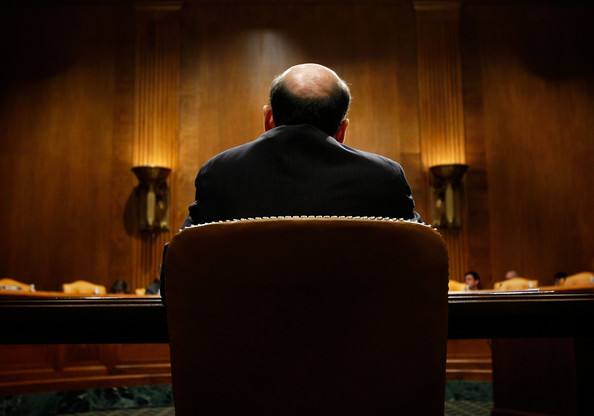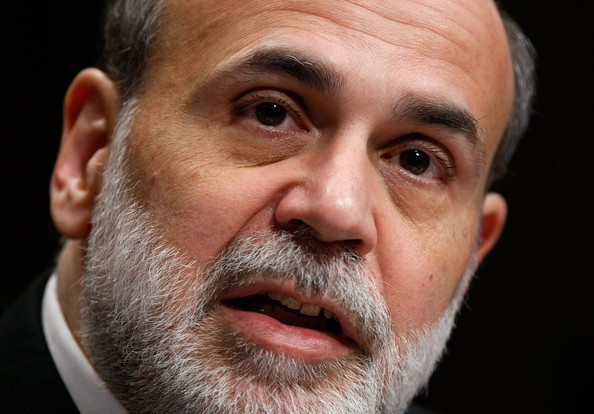Fed Chairman Ben Bernanke discusses bank mergers, mortgage crises, the stimulus package and consumer confidence at Morehouse College in Georgia.
Part II of B-52's speech at Morehouse.
Q & A from Bernanke speech.
Reacting to Fed chief Ben Bernanke's comments, with James Bianco, Bianco Research president; and CNBC's Rick Santelli, Steve Liesman & Erin Burnett.
 After the jump we have the speech, the transcript, video of the Q&A, and a CNBC clip of reaction from Liesman and Santelli.
After the jump we have the speech, the transcript, video of the Q&A, and a CNBC clip of reaction from Liesman and Santelli.
From Reuters CNBC:
Federal Reserve Chairman Ben Bernanke said Tuesday the latest figures on housing and consumer spending suggest a rapid contraction in the economy could be easing.
"Recently we have seen tentative signs that the sharp decline in economic activity may be slowing, for example, in data on home sales, homebuilding and consumer spending, including sales of new motor vehicles,'' Bernanke said in a speech at Morehouse College in Atlanta.
The remarks, which were about the extensive actions the central bank is taking to stem the financial crisis, were posted on the Fed's website ahead of time.
Earlier Tuesday, President Obama proclaimed signs of economic progress but also warned Americans eager for good news that "by no means are we out of the woods."
Some recent reports have suggested a moderating of the economy's downturn but data Tuesday was less encouraging, with the Commerce Department reporting retail sales fell 1.1 percent in March where economists had foreseen a 0.3 percent rise.
Calling the current financial crisis the worst since the Great Depression, Bernanke explained the litany of emergency measures taken by the central bank and the Treasury Department with the aim of restoring battered credit markets.
The Fed, which has cut interest rates effectively to zero, has also created a broad range of lending facilities to ensure that banks can remain above water despite massive losses from mortgages and other consumer loans.
Bernanke said some of the programs might one day have to be removed in order to prevent all the stimulus from building into an outright threat of inflation.
"We have a number of effective tools that will allow us to drain excess liquidity and begin to raise rates at the appropriate time,'' he noted. "That said, unwinding or scaling down some of our special lending programs will almost certainly have to be part of our strategy for removing policy stimulus once the recovery is under way.''
That day was clearly not at hand quite yet, since Bernanke said the Fed was exploring an expansion of the types of credit made available through its program to restart securitization markets, known as the Term Asset-Backed Securities Lending Facility or TALF.
Bernanke did not specify what areas he had in mind, but analysts believe it would include bonds backed by commercial real estate, a sector that has been deteriorating quickly in recent months.
The TALF so far has seen much weaker demand than the Fed had foreseen.
While the central bank had allotted $200 billion in loans, only about $6.4 billion in deals have emerged in two auctions thus far.
Bernanke took pains to justify actions taken to save insurance giant AIG, which has been embroiled in a controversy over lavish bonuses paid after the firm was already on taxpayer-funded life support.
He argued that the firm's collapse would have compromised the entire global financial system.
Nonetheless, he argued that direct support to financial institutions and loans to investors would not compromise the taxpayer, or lead to the threat of inflation.
"I can assure you that monetary policy-makers are fully committed to acting as needed to withdraw on a timely basis the extraordinary support now being provided to the economy, and we are confident in our ability to do so,'' Bernanke said.
The U.S. economy could emerge from recession in the fourth quarter of 2009 as fiscal and monetary stimulus kick in, though the recovery is likely to be subdued, an economist with the San Francisco Federal Reserve Bank said Tuesday.
John Williams, director of research for the San Francisco Fed, said in the bank's latest "FedViews" newsletter that the U.S. economy probably shrank in the first quarter at a rate similar to, or slightly greater than, the 6.3 percent reported for the fourth quarter of 2008.
Beyond that, though, "we expect real GDP to decline at a significantly more modest, 1.25 percent annual rate in the current quarter," he said.
Among the positive signs now emerging, Williams said housing market indicators "have stopped their headlong plunges and show some tantalizing signs of improvement," helped by falling mortgage rates.

bank bailouts, bank bailout news, financial crisis